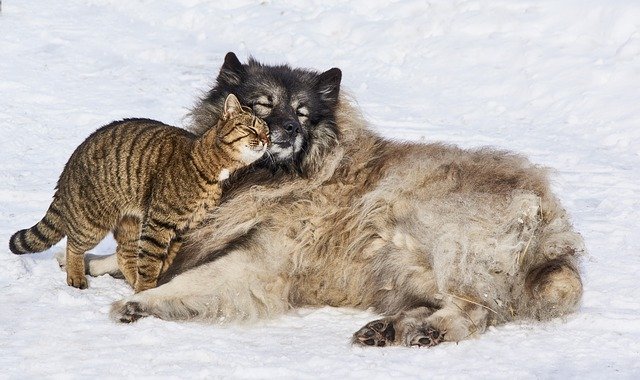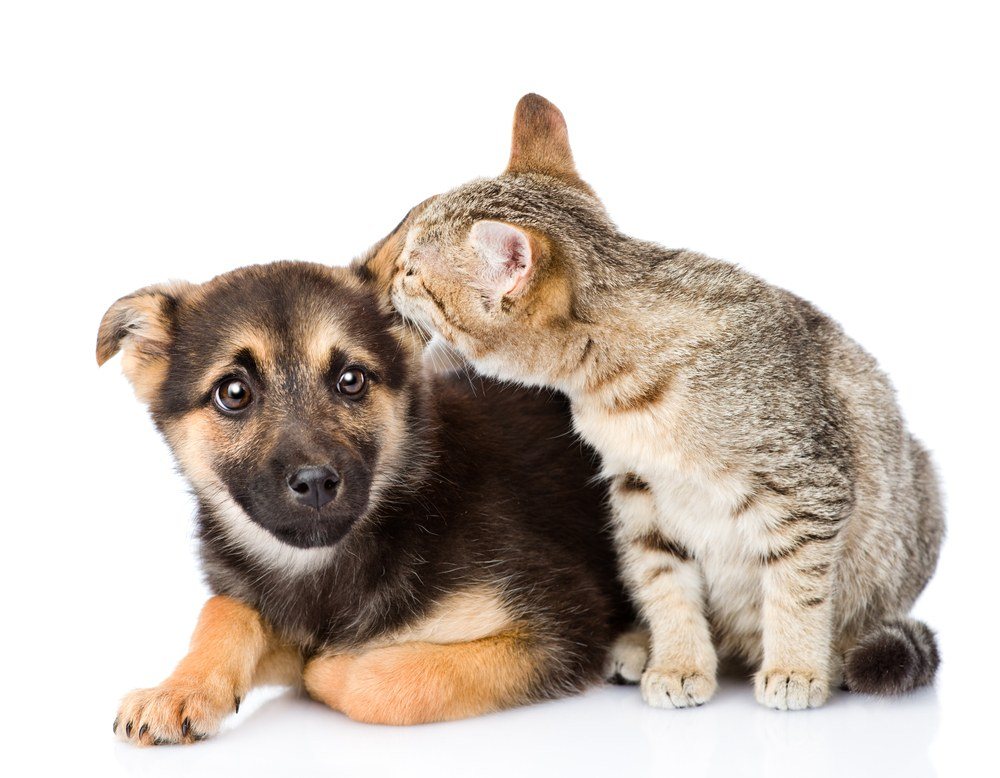Cats make great companions but they can sometimes display quirky and bizarre behaviors.
Whether they are acting on natural instincts or trying to communicate, some of their behaviors are mysterious and sometimes downright gross.
Licking other pets’ ears is one of these feline quirks that send many cat owners into tailspins of wonder and doubt.
You may have noticed your cat licking your dog’s ears. While this behavior is not uncommon among pets, many cat owners still wonder what their kitties are up to.
To help you understand your fur baby better, here are possible reasons why cats may engage in this peculiar behavior:
1. Cats like Earwax
Many cats are often drawn to earwax because of its content: wether humans’ or pets’, earwax is mainly composed of dead skin cells and fatty acids.
These are basically animal proteins and it is their scents that many cats want to eat.
Let’s explain…
Generally, your cat’s food has a higher percentage of animal proteins, which are derived from chicken, beef, and fish.
So, your cat will always be attuned to things that have scents of animal proteins.
Again, you need to think about the diet that your cat’s ancestors survived on in the wild.
They preferred meat. Even the modern big cats are all obligate carnivores—they have to consume meat to survive.
When your cat smells the proteins in your dog’s earwax, therefore, it gives her the sense of her usual diet, so she’s drawn to it.
Besides, while earwax may look and taste horrible to us, it is a different story with our feline friends.
Cats are not as sensitive to taste as humans. They only have a few hundreds of taste buds compared to our 10,000+ taste buds (but remember that their sense of smell far outweighs ours).
So, what your kitty is interested in eating can be different from what you would go for.
The doggy earwax that seems horrible to us is probably the equivalent of catnip to your kitty.
The more she smells it, the more she wants to taste it!
2. Affection

Many people believe that cats and dogs can rarely live in harmony. However, there are instances when cats and dogs become instant friends.
And even in homes where they never become the best buddies, they can learn to tolerate one another and perhaps call a truce so that they can co-exist peacefully.
So, when you see your cat licking your dog’s ears, it may be an expression of the bond or friendship that exists between them.
This can further be justified by the fact that many animals use grooming as a means of bonding.
Mama cats, for instance, groom their babies from time, and the behavior continues to show affection, acceptance, and respect among adult cats.
Remember that sometimes our pets’ behaviors are not simply “behaviors” but parts of complex means of communication.
Probably your cat is trying to tell your pup that “you are family, I give you my respect!”
3. Grooming Favor
In cat societies, grooming each other’s ears, faces, necks, and heads is commonplace.
With areas like ears being particularly hard to groom, you’ll find one cat stepping up and licking another’s ears clean.
A cat licking a dog’s ears can also be connected to this kind of instinct—probably the cat has realized that her canine buddy would benefit from some ear cleaning exercise, and does it for him.
4. Ear Infection
If your cat has taken a sudden interest in your dog’s ears, probably your Fido is suffering from an ear infection.
Pus, discharge, inflammation, and other side effects of ear infection can produce a certain smell that’s particularly intriguing to a cat’s refined smell receptors.
Check your pup’s ears for signs of inflammation, hair loss, odor or excessive itching, and if you suspect that there is a problem, consider taking him to a local vet for a professional examination.
What Action Should You Take?

A cat continuously licking your dog’s ears can give your dog serious ear problems.
Cat’s saliva has a lot of bacteria, so encouraging the licking behavior can cause serious infection in your dog’s ear canal.
Licking can also cause soreness of the dog’s ears. And if your dog is being treated for an ear infection, encouraging the behavior can worsen his condition and your cat may unintentionally ingest the medication.
The best thing to do if you notice this creepy behavior, therefore, is to discourage it.
Here are a few tips you can leverage:
- Redirect the Behavior: If you can’t keep the cat off your Fido’s ears, consider redirecting the behavior by giving her some stinky treats. Whenever you see her reaching out for a lick, use the treats to guide her away from the dog’s ears. There are higher chances that she’ll consider the treats as a tastier alternative.
- Offer her a few toys to lavish her affection: Having something to occupy your cat’s mind is a great way to make her forget certain things.
- Consult your Vet: Continual licking of other pet’s ears can be a sign of compulsive behavior disorder, which often occur in pets that don’t get enough mental stimulation or suffer from stress or anxiety. So, if feel that your cat’s ear-bashing behavior is out of the norm, it is worthwhile to visit your vet.
Final Thoughts: Why Does My Cat Lick My Dog’s Ears?
There you have it! As disgusting as it may look, you now understand why your cat can’t get enough of your Fido’s ears.
But don’t despair because your fur baby is not the first cat to display the behavior.
It is normal, and as long as the ear licking habit doesn’t cause problems for your dog, it is considered an intrinsic feline quirk.
The most important thing is to ensure that it doesn’t evolve into something bad or unhealthy.
Finally, like any undesired behavior in our pets, it may take a little work to redirect or discourage the behavior.
So, be consistent with how you handle cat’s unwanted licking ritual.
Even if she doesn’t stop the behavior completely, there is a high chance that by implementing the above tips it will happen less often.

Hi! I am Eleanor Price. I started this website after my cat, Louie, almost died from a case of botulism (a type of food poisoning often caused by bacteria that grow on food items). Turned out that my cat’s diet was the problem. I have made it my duty to provide the best information and recommendations about everything cat lovers need to know about their felines’ health and wellbeing. My goal is to find the most informative content on anything feline-related and share it with fellow hardworking kitty lovers.

